Nothing beats a hot summer day like jumping into the swimming pool to cool down!
Until you realize you’re sharing the pool with bees and wasps as well. Then you’ll take ANYTHING that doesn’t involve those insects.
Fortunately, you can keep them from ruining your summer fun! Below are a few ways how to keep bees and wasps away from a pool:
How to Keep Bees Away From a Pool
Bee stings can HURT. Not to mention they can be a health hazard if you’re allergic to them.
Below are five ways to keep bees from the pool:
1. Limit Flowers Around the Pool Area
It’s in a bee’s nature to be drawn to nectar so having flowers around the pool is a sure invitation for bees to join your summer party.
To lower the chances of being greeted by bees, simply transfer the plants to another part of the backyard (or at least further from your pool).
Important note – Flowers around the Pool Area
You should remove fake flowers around the pool area as well. This is because bees are also attracted to the colors of flowers, not just the scent of nectar.
2. Place the Right Plants
Bees usually LOVE being around plants, but there are some that they don’t like.
Some scents that they don’t like are:
- Lemongrass
- Mint
- Eucalyptus
- Wormwood
You can deter bees with just these if you put enough of them around the pool area. Aside from the actual plants, you can use essential oils.
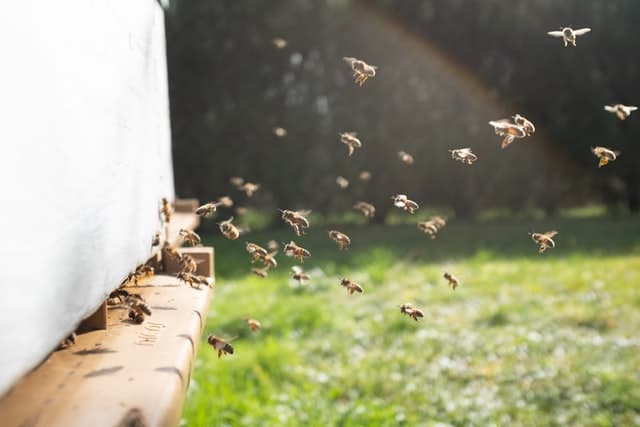
Emulsify a few drops of a scent they don’t like, then pour it into the pool.
A great thing about using oils is you need only very little. This won’t hurt them, and diluted quantities won’t harm you either.
But it’s best if your pets don’t drink the pool water, just to be on the safe side!
3. Use Household Items
Yes, some of the things in your house can actually be used to repel bees!
Soap and Water
Rather than repelling bees, this will kill them.
Simply mix dishwashing soap with warm water to create a lethal soapy water spray for bees.
The idea behind this is if the forager bees (a.k.a those that leave the hive) don’t come back, they won’t be able to tell their hive that your swimming pool is a good water source.
Vinegar
You can add vinegar to your pool water to repel bees.
This is because it makes the water taste unappealing to them. If the pool stays like that for long, they’ll eventually move on to find an alternative water source.
However, you’ll need to make your swimming pool clean first before you can swim in it again. And be careful that your pets don’t drink water from the pool either!
ANOTHER OPTION is to make a vinegar-water spray.
Similar to the soap water, just spray it on the bees you see. This way, at least you won’t have to sacrifice your pool fun.
Dryer Sheets
Dryer sheets naturally have strong and concentrated scents that bees don’t like. Most dryer sheets also have oily textures, which bees don’t like either.
To use them as bee repellent, just place them around the pool area.
But remember that their smell will wear off over time. So replacing the dryer sheets every week or so should be part of your pool care routine.
4. Buy a Pool Cover
Pool covers can be expensive, but they’re a great investment in keeping bees (and other pests) away from your swimming pool. They’re a simple solution too!
Make sure that it covers the WHOLE of your pool so the bees can’t get to the water.
If you keep the pool covered for an extended time, the bees will find a different water source and leave yours alone.
Having a pool cover also helps you keep the pool clean, bumping off a task (or two) from your pool maintenance list!
5. Get Rid of the Beehive
If it seems like a bunch of bees are having their own pool party, you may have a hive on your property.
Wear protective clothing and gloves while you locate and remove the nest.
If you’re successful, the bees will either die out or find a new place to start another hive.
How to Keep Wasps Away From a Pool
Wasps are HARDER to get rid of than bees. Aside from that, they can sting you more than once when they attack!
This is because they don’t die after stinging you as bees do.
Below are five ways to keep wasps from the pool:
1. Hang a Decoy Nest
Wasps are naturally VERY territorial.
This means if one group sees signs that there’s another group in the area, they normally stay away.
And the most obvious sign of another group is a wasp nest. In that case, the new wasps will likely want to move to a place that they can call their own.
You can buy decoy nests online, or you can also make your own.
Just blow up a paper bag in the shape of a nest. You can put a few mothballs in the bag before closing it since wasps also HATE the smell.
Hang a few nests around your pool (or property as a whole). It would be best if you did this ideally early in spring before they create their nest.
This way, you can somehow control where wasps will nest.
Wasp Trap for Outdoor – Hanging Honey Bee Trap
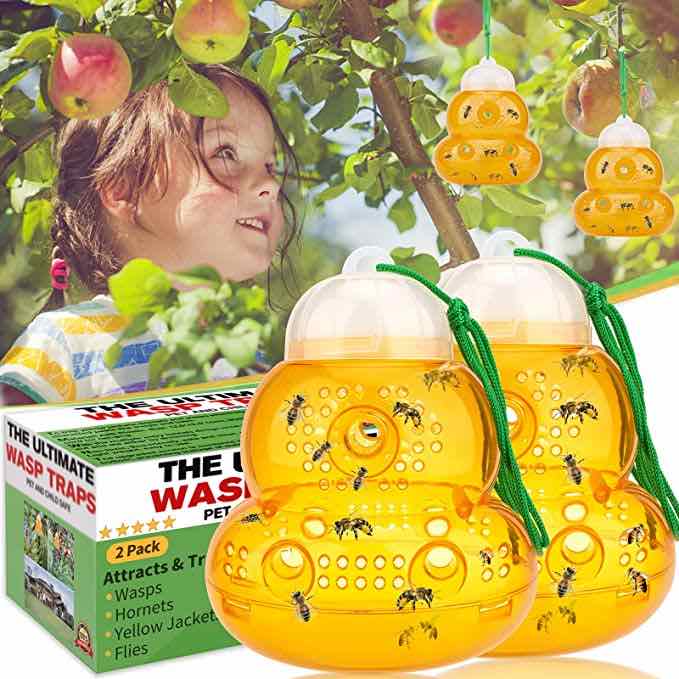
🐝 2 Pack Yellow Jacket Trap Wasp Trap Outdoor Hanging
Trouble with wasps, bees, repel-pesticides hornets, or yellow Jackets in your garden?
Choose this wasp trap! You will easily and quickly resolve the rid of annoying wasps.
2. Trap Them With Diesel Fuel
For some reason, wasps like the smell of diesel fuel. You can use this to your advantage to TRAP THEM.
Fill a plastic bottle with diesel fuel and grease the sides so they can’t crawl out. When the wasps get in the bottle, they’ll drown.
3. Use Raw Meat
You might have noticed how wasps invite themselves to barbecue cookouts. That’s because they’re carnivores that love raw meat.
And you can also use this to your advantage!
Hang some leftover or cheap raw meat far from the pool. This will attract the wasps and leave you alone.
HOWEVER, use only enough meat that they can go through it relatively quickly.
If you go around hanging three-pounders, you’ll also be bothered by the smell of rotting meat. You’ll have to deal with other insects, like flies and maggots, as well.
You can also put a bucket of soapy water under the raw meat so that any wasp that falls will drown.
4. Have Wasp Repellent
If you’re keeping bees AND wasps away from your pool, you’ll need to add more things to your arsenal of natural repellents.
Some plants that wasps don’t like are:
- Basil
- Lavender
- Citronella
- Spearmint
You can also cut a lemon in half and stick whole cloves in them. Then put these on plates and place them around the pool area.
STEM against Wasps, Hornets and Yellow Jackets
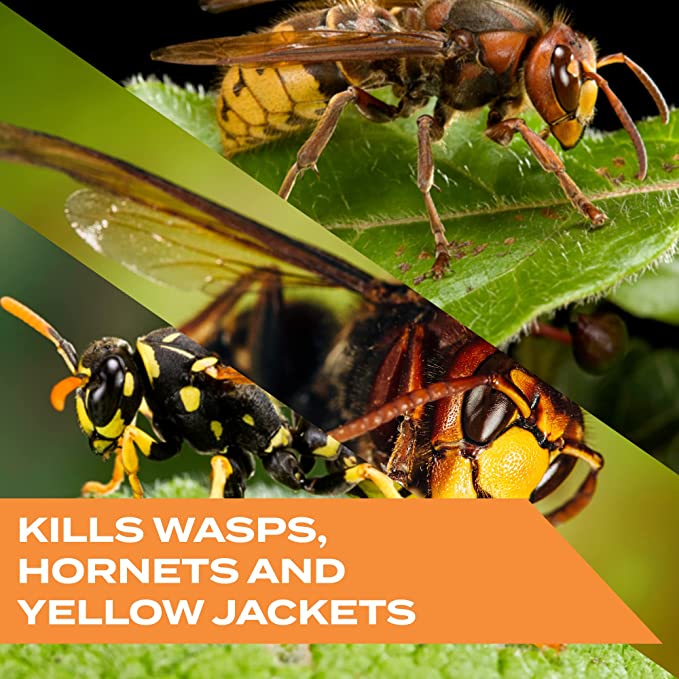
Introducing STEM for home and outdoors made with botanical extracts that are safe for you. STEM’s scientists decode the power of nature to optimize botanical extracts to effectively and safely protect your family, home and pets.
Formulated with botanical extracts, it has no added dye, fragrance, or harsh chemical odors. Made for outdoor use. Safe for use around kids and pets (when used as directed) and tested by entomologists.
5. Remove the Wasp Nest
Similar to getting rid of the beehive, put on protective clothing and gloves.
But remember that they can sting you multiple times, so there’s a higher chance of getting stung more times.
If you choose this option to solve your wasp problem, you’ll have to do it at night. This is when wasps are least active.
Time needed: 4 days
Remove a Wasp Nest in four easy steps
- Buy wasp killer spray
There are plenty of good sprays out there, I can recommend Raid® Wasp & Hornet Killer.
- Spray the nest from as far away as possible
Most sprays allow you to spray up to 20 feet away from the nest. The mentioned Raid brand allows up to 22 feet.
- Do this for a few nights until the nest isn’t active anymore
It’s important to repeat the process to make sure the nest isn’t active, otherwise the wasps will keep coming back and repairing.
- When you’re sure the wasps are gone, you can remove the nest
Use protective gear and a garbage bag to cover the nest. Gently pull the nest from the object (wall, ceiling, plank) it’s attached to and then quickly seal the bag.
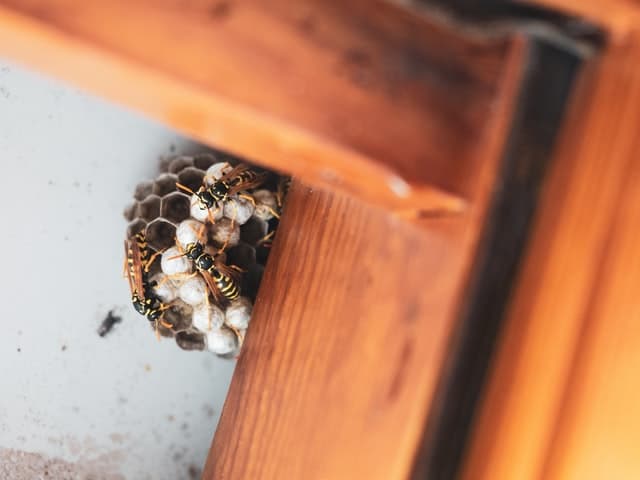
Why Do Bees and Wasps Hang Around Swimming Pools?
Bees and wasps drink from the pool and cool off.
Another reason is that your backyard functions as a small ecosystem for them. This means they can make use of the plants you have there.
In the case of the carnivorous wasps, they can also hunt for insects.
As individuals, bees use the water to dilute their honey. Interestingly, it’s also part of their air conditioning system!
Bees collect water and return to the hive, then fan it with their wings until it evaporates. Similar to humans sweating, the beehive will cool as the water dissipates.
As for wasps, some species use water in nest construction.
Should I Be Scared of Bees and Wasps?
The idea of experiencing a bee or wasp sting is certainly scary, but these insects aren’t out to get you.
In fact, they’re actually scared of you too!
Normally, a person’s first instinct when seeing them is to run or try to hit them. Bees and wasps will see this as a threat and will either fly away or try to sting you.
Bees, in particular, will sting you only as a last resort. After all, a bee dies after stinging someone.
Wasps are scarier since they will likely keep stinging until you stop trying to hurt them. Or until you’ve successfully managed to get away from them.
The bottom line is, while you’ll have to be CAUTIOUS about bees and wasps around your pool, you shouldn’t worry much about getting stung so long as you mind your own business.
Recommended reading:
Frequently Asked Questions
Bees and wasps can be scary to deal with. Below we answer a few questions that can help you:
Can I Swat at Bees and Wasps?
NO.
As already mentioned, these insects won’t sting you unless you give them a reason to.
The best thing to do when you spot them is to keep CALM. Don’t make any sudden movements.
Just keep your distance and let them fly away on their own. If you’re really bothered by their presence, GENTLY blow them away.
Even if you’ve disturbed them, it’s best to just run from the area and find shelter until they leave you alone.
When Should I Call a Professional Beekeeper?
Seek professional help if you have a BAD bee problem.
A local beekeeper can relocate the beehive to a better place. They’ll also do it in a way that doesn’t damage or kill the bees!
If you can’t get hold of a beekeeper, an exterminator can also help. But you’ll have to tell them beforehand if you want them to kill or just relocate the bees.
As for dealing with wasps, keep in mind that beekeepers don’t handle wasps.
If you have a wasp problem, you’ll have to call a pest control company.
But you’ll also have to tell them if you want them to just use insecticide on the nest or if you want it relocated.
Are There Tips That Work for Both Bees and Wasps?
Yes, there are! Below are a few to try:
1. Have a Different Water Source
To keep bees and wasps from coming back to your pool, you can just provide an alternative water source.
Something simple like a bird fountain or shallow bird bath already works well.
But for this to work, it’s best to install the new source AFTER you’ve drained or covered the pool for a long period.
This familiarizes them with that new water source, lowering the chances of them targeting the pool.
Another tip is to try to figure out where they’re coming from. This way, you can put the new water source between your pool and their nests.
Also, try to situate it where there are fewer people — preferably at a far corner of your yard.
2. Make a Bee/Wasp Trap
There’s an easy DIY trap that works on both bees and wasps.
Sugar + water (or any sweet liquid) should do the trick. Grease the sides of the bottle (especially the inner opening) so they can’t crawl out.
Keep the bottle away from the pool so you won’t accidentally attract them to the water.
3 – Use Pesticide
Using chemicals should ideally be the last resort.
This is because these can contaminate your backyard — from your pool to the grass — making for a pretty unsafe environment for you and your family.
However, using pesticides will also keep other pests, like cockroaches and fleas, from your yard.
But among the chemicals in pesticides, cyfluthrin is especially lethal to bees and wasps.
This is also bad for fish and other invertebrates, but it’s not as bad for mammals (including humans).
Conclusion
Aside from the typical pool care of cleaning and maintaining the water, pool owners also need to deal with bees and wasps.
Fortunately, there are a number of safe ways you can deal with them.
If you think your bee and wasp problem is getting too much to handle alone, call in a professional to help you.
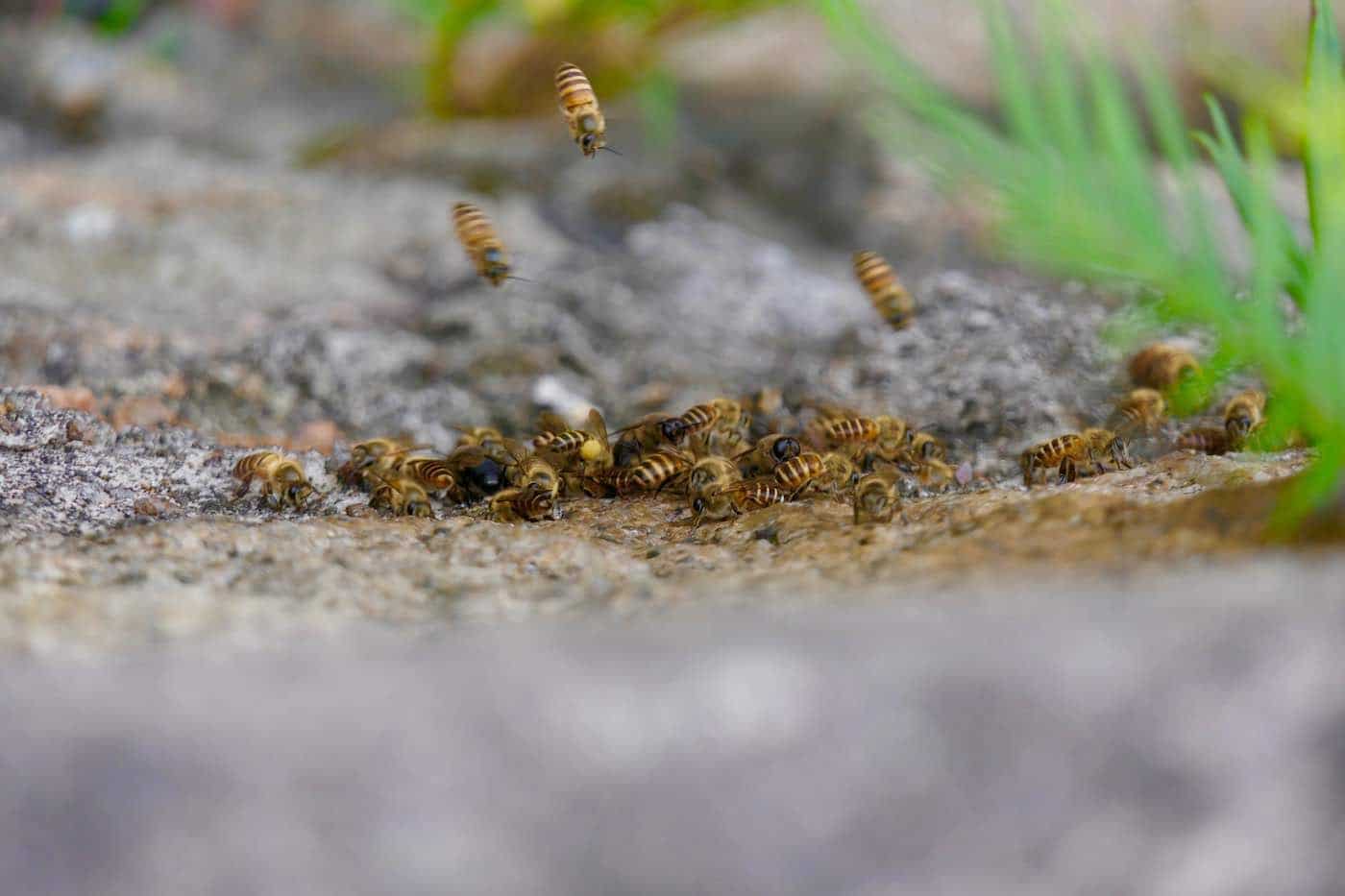
1 comment